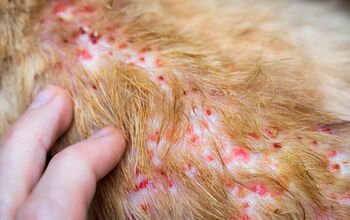6 Tips On Living With Cat Allergies

Many people who suffer with pet allergies think that they have to give up on the idea of adopting a cat, and they probably also find it nearly impossible to visit friends and family who own cats. Thankfully, though, there are ways for allergy sufferers to manage cat allergies.
So before you think you have to get rid of your cat or you have to live a life without the companionship of a furry feline, we’ve put together a few tips that will help you live with cat allergies.
Related: Hypoallergenic Cats – Do They Really Exist?
What Causes Your Allergic Reaction?
Before you learn how to tackle your cat allergies, it’s a good idea to understand what’s actually causing the allergic reactions. According to WebMD, it isn’t a cat’s fur or dander that results in allergies. Instead, proteins that are in the dander are what many individuals are allergic to.
These allergens are also found in a cat’s saliva and urine. And because they easily become airborne, many people don’t even need to touch or go near a cat before they start suffering with allergic reactions.
Related: Top 4 Most Common Cat Allergies
Tip Limit Upholstered Furniture, Rugs, and Carpets
Upholstered furniture, rugs, and carpets can trap allergens and make it difficult to eliminate them from your environment. That’s why it’s recommended that you stick with hardwood flooring instead of carpeting, if possible. And if this isn’t possible or you simply prefer carpets and rugs, just vacuum and steam clean them often. Limit upholstered furniture, too, if possible, or vacuum it regularly as well.
Tip Use HEPA Filters
Because many allergens are circulated back into the air while you vacuum, investing in a vacuum cleaner that contains a HEPA filter will trap allergens and prevent them from being blown back into your environment as you clean.
Also, a stand-alone HEPA air filter and purifier will get rid of tiny allergens, including cat dander. You should keep the filter on for at least four hours a day for the best results.
Whenever possible, it’s also a great idea to open up windows throughout your home to increase ventilation and get some fresh air.
Tip Take Medicine
Another option would be to take prescription or over-the-counter antihistamines, eye drops, aerosol inhalers, decongestants, etc. to reduce your symptoms (these won’t get rid of your allergy). Allergy shots, also referred to as immunotherapy, are also an option.
Or you could instead take a more natural and holistic approach by trying things like acupuncture, nettle tea, quercetin, or antioxidants like vitamins C and E to reduce the effects of your cat allergies. You can even try eliminating certain foods from your diet that may trigger allergies, such as dairy, gluten, sugar, soy, eggs, and artificial ingredients.
Tip Clean Regularly
Establishing a regular cleaning routine is necessary if you have cat allergies. Scrub woodwork and walls that allergens can stick to, wash throw rugs, shampoo carpets, keep your home neat and organized, and use a damp cloth whenever you dust in order to trap the allergens rather than move them around. Also focus on keeping cat beds and cat trees as clean as possible.
Tip Cover Heating and Cooling Vents
To reduce the allergens throughout your home, you can place cheesecloth over air conditioning and heating vents. And you can also install air cleaners with HEPA filters on your air conditioning and heating systems to prevent the allergens from circulating.
Tip Focus on Your Cat’s Health
Cats who are fed a high quality diet tend to have healthier skin and coat, and they may also be less likely to shed high amounts of hair and dander. If you aren’t sure what type of food would be best for your cat, ask your veterinarian for advice.
Get Tested to Be Sure You Have Cat Allergies
To be absolutely certain that your allergies are caused by cat dander, get tested. You may find that something else is causing your allergy, or that a combination of allergens are to blame. Knowing this will help you tackle the problem more effectively and get the relief you need.

Lisa Selvaggio is a freelance writer and editor, and our resident cats-pert, with certifications in pet nutrition and pet first aid. She enjoys producing content that helps people understand animals better so they can give their pets a safe and happy home.
More by Lisa Selvaggio






















